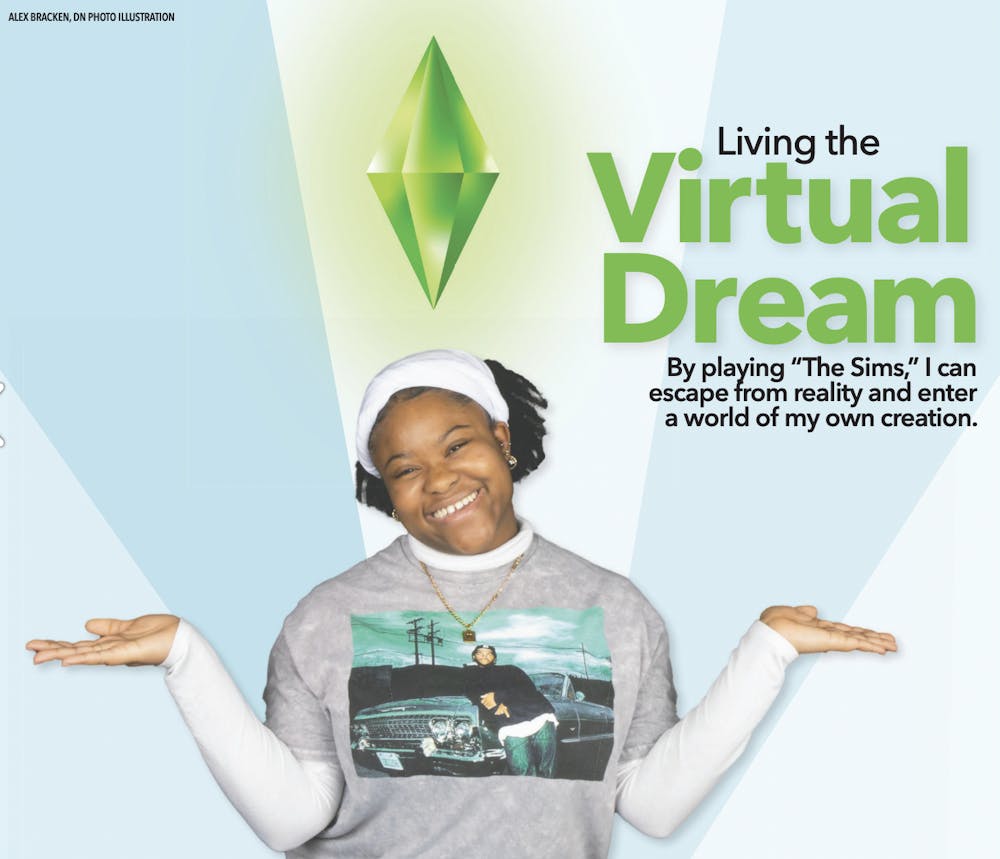KwaTashea Marfo is a second-year public relations major and writes “Imperfectly Perfect” for The Daily News. Her views do not necessarily reflect those of the newspaper.
I was seven years old when I was introduced to a game that would ignite a lifelong passion in me.
From the moment I laid eyes on “The Sims 3,” I was mesmerized. I watched in awe as my aunt took much pride in the way she crafted entire neighborhoods and houses, filling them with characters of her own creation on her PC.
It was like watching a master artist at work, and I was immediately drawn to the level of care and detail she put into each and every aspect of the game.
I too fell in love with The Sims, specifically as the game always loaded into cue, resuming wherever it had left off.
The Sims offered me a gateway to create and explore without any set objectives or goals. It was like having my own virtual dollhouse, a world where I could let my imagination run wild and experiment with different scenarios.
One of the things that really stood out to me about The Sims was the use of Simlish, a fictional language created by the game’s designer Will Wright. Hearing the characters speak this unique and quirky language only added to the game’s appeal and helped to immerse me even further in this imaginary world.
As the years went by, my love for The Sims only grew stronger, and I realized it was much more than just a simple hobby. It was a gateway to a world of creativity and imagination, a place where I could let my mind run free without direct consequences of my actions.
Now, as I approach my 13th anniversary playing this game, I am filled with a sense of gratitude for the impact it has had on my life. The Sims will always hold a special place in my heart, as it has helped ease my anxiety and provide a conventional way of comfort.
Frequently, video games are frowned upon for their links to detrimental effects on mental health. But what about the positive impact a game like The Sims has on individuals, such as myself, who are living with anxiety?
According to a 2021 study conducted by JMIR Publications, video games extend beyond the boundaries of entertainment to emphasize a sense of enjoyment and intrinsic motivation to offer psychological support to people.
From an early age, I found solace in developing and executing well-structured plans, which give me a sense of control and order. However, when unexpected events disrupt my plans, I tend to experience heightened anxiety and self-doubt.
Despite my efforts, I have come to realize it is impossible to micromanage every aspect of life. Life’s unpredictability can bring about grief from the loss of a loved one or heartache from failed relationships. It’s easier for me to fast-forward through a Sims workday than to cope with the stress of a typical day in my everyday life.
Playing Sims has become a coping mechanism for me to regain a sense of control when I feel powerless in real life. I can carefully manage the lives of my Sims characters from the safety and comfort of my own home, free from anxiety and self-doubt.
By creating intricate narratives for my Sim families, I can craft a world perfectly aligned and free of imperfections.
This world allows my Sim families to fully embrace their Black identities without experiencing any judgment based on preconceived notions about their skin color.
In my Sim universe, female characters have equal opportunities to their male counterparts and can fully exercise the rights to their autonomy without any restrictions.
As I add each expansion pack, I get to watch my Sims grow as they start families and explore various career opportunities, such as becoming a tech guru or a renowned actress. Whether they choose to parent or adopt pets, my Sims are free to live their lives without any social unrest or political debates over human decency.
With over 200 million copies sold worldwide, the game developed by Maxis and published by Electronic Arts has brought joy to users across the globe. The game's lighthearted nature, characterized by humorous interactions between characters and the ability to download mods for an enhanced gaming experience, caters to a niche demographic of players, including myself, who use the game as a platform to create and improve real-life scenarios.
Its global impact has created a diverse community of talented players who have created an everlasting impact on pop culture by having a dedicated YouTube community and having individuals stream their game play on YouTube, Twitch and TikTok.
The Sims, through its regular updates, continues to ignite users' imaginations and encourages them to break free from conventional thinking. Electronic Arts has a dedicated team who celebrates diversity by featuring Black, Latin and LGBTQ+ communities in the game, showcasing the limitless potential of virtual world creation both in-game and in real life.
In this way, whenever users immerse themselves in the Sims world, a sense of calm envelops them, gradually easing them from the stresses of reality.
By exploring virtual worlds with engaging gameplay, non-gamers can also find solace and experience the boundless potential of immersive gaming experiences. The Sims, with its stress-relieving features, is an excellent option for those seeking to alleviate anxiety and reduce stress levels.
Contact KwaTashea Marfo with comments at kwatashea.marfo@bsu.edu or on Twitter @mkwatashea.





The Daily News welcomes thoughtful discussion on all of our stories, but please keep comments civil and on-topic. Read our full guidelines here.